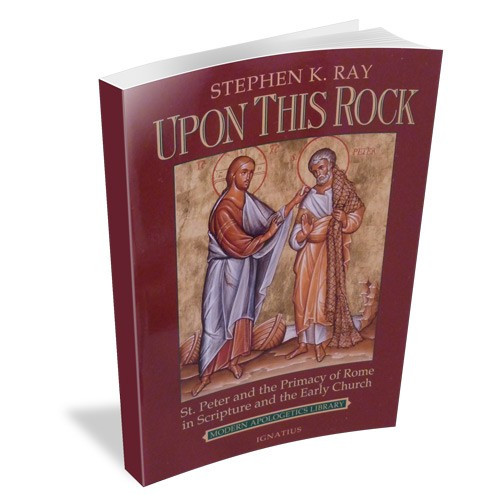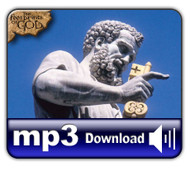Product Description
Upon This Rock, Signed
350 Pages
- Audio: EWTN's Bookmark Interview
- Steve Ray's 17-part Response to William Webster's "Rebuttal_ of Upon This Rock
- Webster: Steve's 17-part Response to Webster's Critique of Upon this Rock
- Webster is Wrong: St. Augustine DID believe in the Primacy of Rome
- Webster is Wrong about St. John Chrysostom too!
- David Palm comments on Webster's Critique of Upon this Rock
- Book Review by Catholics United for the Faith
- Book Review in The National Catholic Register
- Book Review in This Rock Magazine
- Steve Ray responds to James White's "Catholic Legends" and defends his book Upon this Rock, Part One
- I Must Have Gotten Under the Man's Skin: Steve Ray's Open Letter Regarding James White's Web Critique, Part Two
- _Where Confusion Abounds_ Steve's response to Matthison's _The Shape of Sola Scriptura_
- Scott Windsor Defends Steve Ray and Refutes White on St. Augustine
- Scott Windsor, part II: the Myths of James White
- Shawn McEhinney Defends Upon this Rock and St. Augustine against James White
- Whelton, Chrysostom & my book Upon this Rock
As an Evangelical Protestant, Stephen Ray realized that the real issue dividing Catholics and Protestants was authority. Everything else was secondary to the issue of authority. Protestants accept the authority of the Bible alone, whereas Catholics understand the authority to be residing in the Magisterium, the Scriptures and the Sacred Tradition.
Ray goes through the Scriptures and the first five centuries of the Church to demonstrate that the early Christians had a clear understanding of the primacy of Peter in the see of Rome. He tackles the tough issues in an attempt to expose how the opposition is misunderstanding the Scriptures and history. He uses many Protestant scholars and historians to support the Catholic position. This book contains the most complete compilation of Scriptural and Patristic quotations on the Primacy of Peter and the Papal office of any book currently available. It has over 500 footnotes with supporting evidence from Catholic, Orthodox, Evangelical, and non-Christian authorities.
I just wanted to let you know what I thought of [Upon this Rock]. I don't have nearly as many books as you. I have a couple of 6-foot bookshelves in my home. But I reserve the uppermost shelf for the books that I think are among the best I've read. And your book, Upon This Rock, is top-center of that shelf. It is an astounding book, well-researched, steeped in erudition, and yet it addresses the arguments, such as they are, of modern critics. A truly marvelous book. Easily the best overall book on papal history since Rivington. And, believe me, I've read a few: Butler, Chapman, Rivington himself, Newman (who, I know, never truly went into much depth on this specific topic), etc. Thanks for a job well done. It has been said that if anyone could be canonized for their writings alone, it wouldbe Dante.
Barry Ukrainetz Thanks to Steve Ray for his work on the papacy and his systematic demolition of Bill Webster's claims [in the debates above]. It is one of the more impressive feats of apologetics that I've seen in my brief experience of Catholic theology.
Jonathan P. This book defends Catholic teaching against the opposition, using current Church teaching on the Old Testament foundation for the primacy and succession of Peter. A rich documentation, a fine study.
Cardinal Christoph Schonborn Upon this Rock is a veritable tour de force on behalf of the Petrine ministry, bringing together exegetes, the Fathers of the Church, the witness of history, and even Protestant scholars. The work is scholarly, fair and objective, and accessible to readers of ordinary intelligence. An impressive bibliography surveys the works of both proponents and opponents of the papacy. Recommended wholeheartedly and unequivocally
The Very Rev_d Peter MJ. Stravinskas Opponents of the papacy like to restrict their argument to the interpretation of a few disputed verses. When patristic commentaries and histories are taken into account, we see that the Evangelical and Fundamentalist rejection of the papacy is both unscriptural and unhistorical.
Karl Keating Hello my brother in Christ. My name is Justin. I'm a senior at the Univeristy of Wisconsin Madison, and I'm a recent convert to the Catholic Church (last December). Well my sponser introduced your book [Upon this Rock] to me and I'm going through it now for the the 4th time. Thank you so much.
Justin I have started reading Upon This Rock by Steve Ray. Also, I have seen the DVD of Mary the Mother of God and I was so surprised to see Steve Ray himself narrating with such great love of Mama Mary and obviously on fire for the love of the Church. It's amazing to see him, speaking in a manner of a Protestant evangelist yet Catholic Theology at its best flowing from his mouth.
Three weeks later: I already reached the halfway pointof Steve Ray's Upon This Rock. Well, Steve really rocks with this book. His scholarly research and his magnificent proofs are impregnable. Steve Ray, defensor fidei I salute thee!
Fr. Abraham Arganiosa
The Somascan Fathers
Manila, Philippines Just a quick note of thanks. An evangelical, self-proclaimed anti-catholic friend of mine, has agreed to an honest and charitable dialog. I_ll be using your book and available rebuttal of Mr. Webster extensively. Thanks!
Joe Pirillo One of my baptismal gifts from my wife was a copy of Upon This Rock. I cannot put it down. It is rich, informative, inspiring and invigorating. I want to go out and convert all the Protestants I know!
Jeff Baker
EXCERPTS & TABLE OF CONTENTS:
From the Introduction: "There is little in the history of the Church that has been more heatedly contested than the primacy of Peter and the See of Rome. History is replete with examples of authority spurned, and the history of the Church is no different. As we proceed with this overview of history, we will allow the Scriptures, the voice of the apostles, and the testimony of the early centuries of the Christian community to speak for themselves. In many quarters, over the last few centuries, the din of opposition and uninformed dissent has drowned out the voices of these ancient witnesses. Novel ideas, like a voracious flood, have tried to erode the foundations and the clear historical precedents provided by the Holy Spirit's work in the primitive Church. History has a clear and distinct voice, but it does not force itself upon us uninvited. History is prudent and waits quietly to be discovered. Conversely, the ingenious inventions of recent theologians and innovators are loud and demanding, bursting upon our ears and minds, our lives and hearts, demanding our immediate attention and loyalties. The riches of history fall quietly aside as the prattling innovators blast their trumpets and loudly parade their followers through new streets, trampling the knowledge of the ages under their cumulative feet. Here we will allow the voices of the past to speak again--for themselves. And what the reader will find is that the utterances of the past still resound with one voice, with clarity and force. To study those who have gone before us, following in the footsteps of the Lord Jesus, his apostles, and our Fathers in the faith is to lose interest in much of the clamor of modem notions. We find these theological innovations and ecclesiastical groups poorly devised, if not disingenuous. This is what John Henry Newman, a Protestant clergyman at the time, found as he studied the primitive Church. He concluded: 'To be deep in history is to cease being a Protestant'."
On the Name "Peter" in Matthew 16: "We know that Jesus spoke Aramaic, not Greek. The Greek words 'Peter' (Petros) and 'rock' (petra) would have been the same Aramaic word Kepha (from which we get Cephas).There is no distinction between the two words as Jesus spoke them. James G. McCarthy, seeming to ignore all recent scholarship on this Matthean passage, writes, in The Gospel according to Rome (Eugene, Ore.: Harvest House Pub., 1995), 242: 'Why did not the Holy Spirit just repeat the word petros, as Catholic defenders speculate He did in the Aramaic? Then Matthew 16: 18 would read, 'You are Peter (Petros), and upon this rock (petros) I will build My church'." The simplest reply, which should be understood by anyone with the most rudimentary knowledge of biblical Greek, is that in the Greek language nouns have grammatical gender--something we do not have in English. In Greek, petra is feminine, and Petros is masculine. 'Rock' is feminine in Greek, and when the Aramaic Kepha was translated into Greek, Petros (masculine) was used for Peter's name. Why? For the same reason my mother named me Stephen instead of Stephanie, and James McCarthy's mother named him James instead of Jacqueline (both from Jacob)--Simon could not be given a feminine name. Remember, 'Peter' was not just a description but a new name. Jesus said, 'You are Rock [Kepha] and upon this rock [kepha] I will build my Church.' Thus, the Holy Spirit, through the author of Matthew, used the word Petros to provide a masculine form for the feminine petra."
Understanding the Fathers: This treatise [of Tertullian, referred to in the full text] was written in 220, at the peak of Tertullian's Montanist period. He was in a sect that would have been extremely odious to Protestants and Orthodox today. He scorned the orthodox teaching of the Church and depended upon the ecstatic trances and revelations of two women prophets: Prisca and Maximilla. Interestingly enough, this is the only quotation from Tertullian that William Webster refers to in his book The Church of Rome at the Bar of History--a book with the intent of discrediting the Catholic Church. Webster writes, 'Tertullian, at the beginning of the third century, was the first to identify the "rock" of Matthew 16:18 with Peter in his treatise On Modesty. But what he means by this identification is not that Peter is the rock in the sense that the Church is built on him, but that it is built through him as he preaches the gospel' (48-49). He then quotes the above passage in its entirety. Whether Webster is being dishonest by withholding pertinent information, or whether he failed to research the issue thoroughly, is not certain; but there are two severe problems with his assertion. First, he does not tell us that there is actually a reference to Peter as the "rock" twenty years earlier, made by Tertullian himself while in his orthodox period. We read it a few pages back: 'Was anything withheld from the knowledge of Peter, who is called "the rock on which the church should be built," who also obtained "the keys of the kingdom of heaven," with the power of "loosing and binding in heaven and on earth"?' We also find Tertullian referring to the Church as 'built upon him [Peter]'. Why does Webster not inform his readers of Tertullian's earlier orthodox teaching? Second, Webster neglects to alert his reader to the fact that the passage cited is from the depths of Tertullian's Montanist period--his descent into heresy. Webster himself would recoil at Montanist extremes and would shun Montanist theology, especially the expectation of the imminent descent of the heavenly Jerusalem, coming down from the sky to settle near Pepuza in Phrygia. Is it not curious that Webster, in rejecting the orthodox teaching of the early Church on Peter's primacy (as reflected in Tertullian's orthodox writings), sides with the heretical Tertullian in the interpretation of this Scripture passage?"
St. Augustine and the Protestant Apologists: "This passage [St. Augustine's Retractations] has generated a lot of excitement in those who oppose the Papacy. They mistakenly think they have discovered a nail for the 'coffin' of Catholic teaching, even though Augustine teaches here that it is perfectly valid to understand Peter, in Matthew 16, as the rock upon which Christ built his Church. St. Augustine denies neither the fact that the rock is Peter nor the visible reality of the Church and the primacy of Rome. James White, neglecting to mention everything else in the Augustinian corpus that refutes his proof-texting, touts this passage as some kind of coup de grace (see Roman Catholic Controversy, 121-122). No one denies that the Fathers saw additional applications to Matthew's text (as we see in the Catechism of the Catholic Church 424, 442, 552), but White fails, unhappily, to represent properly St. Augustine, whose constant words and actions professed a thoroughly 'Catholic' understanding of the Petrine primacy in the See of Rome. Even if, for the sake of argument, Augustine had said that Peter was definitely not the rock in Matthew 16 (which, by the way, no Father ever said), the Fathers taught and practiced what most Evangelicals fail to understand--that the Petrine succession was of apostolic origin and was an organic outgrowth of the Holy Spirit's leading and protection of the Church and would have been adhered to even if Matthew 16 had not existed. White also fails to factor in development of doctrine--the fact that Christian doctrine and practice develop over time as the need arises. If we apply White's methodology to the development of the New Testament, we would assert that since the early Chrisfians did not define the canon of Scripture in the precise words of today's Evangelicals, then the New Testament is to be rejected today. It was not until the end of the fourth century that 2 Peter and Jude were universally accepted as canonical. Should we reject them now because the earliest Christians failed to define the canon definitively the way Evangelicals do today? Catholics understand that the earliest Christians may not have appreciated the ramifications of the primacy of St. Peter and his successors. Jesus' words to St. Peter can be seen as a 'prophecy', in the words of Cardinal Newman. The full-blown understanding and implementation of the Papacy took time to develop, just as did the canon of the New Testament and the doctrine of the Trinity. Let us apply White's principle, in his own words, concerning Peter and Matthew 16, to the issue of the canon's development. Regarding the development of the doctrine of the Papacy he writes, 'Notice the huge movement in thought that has taken place between the early part of the fifth century and the latter part of the nineteenth' (Roman Catholic Controversy, 122). But, would not even White have to agree that in the case of the canon of the New Testament there is just such a huge movement in thought--from almost exclusive reliance on oral tradition and no defined New Testament canon, to a list of twenty-seven books that are non-negotiable and required for any Evangelical--which has taken place between the latter part of the first century and the latter part of the fifth? Why does White accept such development in the early Church's understanding of the canon but not in that of the Papacy? White recommends that we read further on the topic: 'The reader is strongly encouraged to read the fine presentations available on this topic', and then he directs us to four sources, to all of which we have referred in this book. But here I would like to address his encouragement to read the History of the Christian Church, by Philip Schaff (Roman Catholic Controversy, 245). What Schaff tells us is what we already know but what James White denies: 'Augustine, it is true, unquestionably understood by the church the visible Catholic church, descended from the apostles, especially from Peter, through the succession of bishops; and according to the usage of his time he called the Roman church by eminence the sedes apostolica [Apostolic Chair]' (History of the Christian Church, 3:307)."
Current Church Teaching: "We will now take a look at the current teachings of the Roman Catholic Church to see if that teaching is still faithful to the ancient tradition and custom of the Church--if it is still loyal to Peter's commission, given by the Lord himself. Those who spend their energies devising ingenious arguments against the Papacy and who even acknowledge, as we saw in the introduction, that 'No father denies that Peter had a primacy or that there is a Petrine succession' ought to consider the ramifications of their stance. If all Christians in the early centuries, even those who learned at the feet of the apostles, believed in a primacy of Peter and a primacy of his successors, why is it there are Christians today who so categorically denounce that primacy? Why should I trust the teaching of such opponents of the Papacy when I can trust the teaching of the whole early Church, 'who still had the preaching of the apostles ringing in their ears and the authentic tradition before their eyes'? The antagonists admit that the question at issue is not whether there was a primacy but how it was interpreted. Our study has shown it was interpreted very literally and very consistently--in line with the teaching of the Catholic Church today. In fact, what we find is that the Roman Catholic Church is the only Church still within the apostolic tradition and functioning according to the principles and customs of the Fathers."
Peter, Jesus' Royal Steward of the Kingdom: "The 'Protestant principle' of Scripture interpreting Scripture is not a Protestant innovation at all. It has been taught and practiced from the earliest years in the Catholic Church, as a short review of the Church Fathers' writings and the subsequent teachings of the Church clearly demonstrates. We will continue applying this principle--Scripture interpreting Scripture--in researching the primacy of Peter. After having already explored the New Testament references, we will now turn to the Old Testament. Knowledge of the culture and society of ancient Israel and its monarchical view of government will help us understand the 'big picture' and how Peter's primacy is solidly rooted in the Jews' understanding of the kingdom of God. We will begin with the profound passage in Matthew 16, in whichJesus appoints Peter the vice-regent, or steward, of his kingdom. To understand this passage in all its glory, one must first have a grasp of the Old Testament and Jewish world view. Understanding the biblical precedents will shed valuable light on Peter and the papal office. What do the Scriptures and history have to say about the 'keys of the kingdom' and, especially, about the steward who carries them?"
Table of Contents
Dedication
Table of Contents
Introduction: St. Peter and the Primacy of Rome 11
Part One: The Apostle. Peter 21
Biblical Study: Peter the Man, the Apostle, and the Rock 23
Historical Study: Was Peter in Rome, Was He the First Bishop of Rome, and Was He Martyred in Rome?63
The Opposition 97
Part Two: The Primacy of Peter in the See of Rome 111
Oldest Documents: Earliest Christian Documents Reveal the Primacy of Peter in the See of Rome 113
The First Epistle of Clement to the Corinthians (c. a.d. 96)
The Epistle of Ignatius to the Romans (c. a.d. 106 )
The First Five Centuries: The Primacy of Rome in the Early Church 145
Part Three: CurrentChurch Teaching 243
Appendix A: The Chronological List of the Popes 255
Appendix B: An Old Testament Basis for the Primacy and Succession of St. Peter 263
Bibliography 299
Index of Proper Names and Subjects 315
Index of Scripture 327
 Loading... Please wait...
Loading... Please wait...









